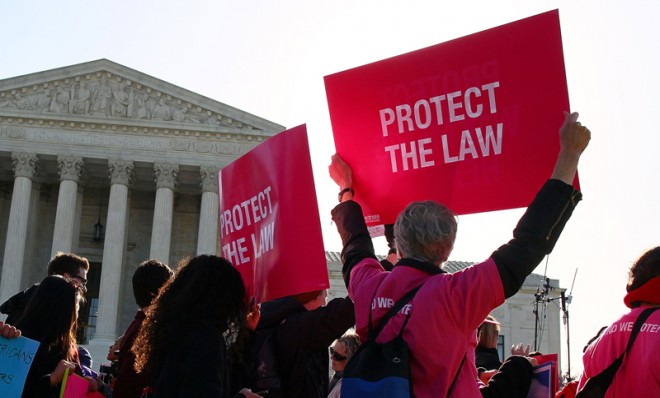How the Supreme Court got on the bad side of everybody
Gallup says the justices' approval rating is near an all-time low


A free daily email with the biggest news stories of the day – and the best features from TheWeek.com
You are now subscribed
Your newsletter sign-up was successful
The Supreme Court's approval rating plunged this month to its lowest level in eight years, according to a new poll from Gallup. After an important term with landmark decisions on voting rights, gay rights, and affirmative action, just 43 percent of Americans now approve of the court — near an all-time low and down 6 percentage points from last September. Forty-six percent of respondents disapproved of the justices, marking the first time their poll numbers have been underwater since June 2005.
Why is the court's popularity suddenly in free fall? Andrew Dugan at Gallup says a key reason might be that its divisive, blockbuster decisions have disappointed conservatives and liberals alike. The justices angered the right when, in a 5-4 vote, they reaffirmed a lower court's overturning of the Defense of Marriage Act; they made the left just as mad when, in another 5-4 vote, they upheld state voter ID laws that Democrats say discourage left-leaning immigrant and minority blocs from casting ballots.
Unlike Congress or the presidency, one might expect the Supreme Court, as a nominally nonpartisan institution, to be sheltered from the public disaffection that has chipped away at the ratings of the other two branches. In reality, though, the court has often been a source of political polarization since 2000 and is hardly immune to the same political forces plaguing the other two branches. [Gallup]
The court, however, has made unpopular and controversial decisions plenty of times in the past. Why is it suddenly facing such a backlash? "The reason that the Supreme Court is not enjoying the immunity to political distaste that it often has," says Maggie O'Neill at PolicyMic, "is because it has been increasingly politicized in our culture, especially over the past few years."
The Week
Escape your echo chamber. Get the facts behind the news, plus analysis from multiple perspectives.

Sign up for The Week's Free Newsletters
From our morning news briefing to a weekly Good News Newsletter, get the best of The Week delivered directly to your inbox.
From our morning news briefing to a weekly Good News Newsletter, get the best of The Week delivered directly to your inbox.
The court isn't the only national institution getting low marks these days, though. Congress' numbers are even lower — way lower. Doug Mataconis at Outside the Beltway says that suggests that Americans are so upset about the state of affairs in bitterly divided Washington that they're angry at everyone.
The real cause for the loss of public confidence in what remains the least political branch of the federal government has less to do with specific decisions and more to do with a general decline in trust for public institutions...The broader point that a poll like this stands for becomes apparent when you take into account other polling that shows that Congress, the Presidency and, indeed, almost any other public institution outside of the military and police seem to have lost the trust of the public. In the long term, that's simply not healthy. [Outside the Beltway]
Furthermore, the Supreme Court is in the unique position of having the last word on so many issues that divide us. It's hardly a surprise that the justices take some of the blame when they take sides on issues the public is still fiercely debating.
A free daily email with the biggest news stories of the day – and the best features from TheWeek.com
Harold Maass is a contributing editor at The Week. He has been writing for The Week since the 2001 debut of the U.S. print edition and served as editor of TheWeek.com when it launched in 2008. Harold started his career as a newspaper reporter in South Florida and Haiti. He has previously worked for a variety of news outlets, including The Miami Herald, ABC News and Fox News, and for several years wrote a daily roundup of financial news for The Week and Yahoo Finance.
-
 The Olympic timekeepers keeping the Games on track
The Olympic timekeepers keeping the Games on trackUnder the Radar Swiss watchmaking giant Omega has been at the finish line of every Olympic Games for nearly 100 years
-
 Will increasing tensions with Iran boil over into war?
Will increasing tensions with Iran boil over into war?Today’s Big Question President Donald Trump has recently been threatening the country
-
 Corruption: The spy sheikh and the president
Corruption: The spy sheikh and the presidentFeature Trump is at the center of another scandal
